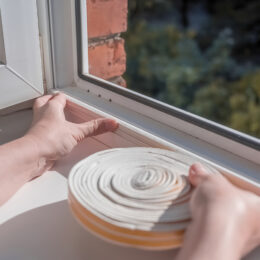
The room air flows through a wet wick inside this evaporative humidifier to add moisture to the air. Photo by Kaz
by James Dulley
We don’t use the AC much during the summer because we prefer fresh air. During the winter, though, we have to close up and run the heat pump.What are some efficient methods to improve our indoor air quality now?
If your family is used to having fresh air in the house, winter months can be a challenge. People often think the filter on their heat pump will take care of indoor air quality. It does help remove particles from the air, but only the ones that stay suspended. Central heating systems with efficient variable-speed blowers, which run slower and longer, will improve air quality.
Particles in the air are only one aspect of good air quality. The humidity level and other odorous and unhealthy chemicals also play a role. Just open the cabinet under your sink where you store cleaners, and you will realize the “soup” of stuff you breathe.
Even though not all particles make it to the heat pump filter, you could try installing a high-quality pleated media filter. It will cost more than the 99 cent fiberglass one, but it is much more effective. This is particularly true for the smallest of particles.
Room-size electronic air cleaners are effective for removing those tiny particles that pop up when you plop down in a chair. They don’t use much electricity and are quiet, so using one in a bedroom at night can help improve air quality.
Although it sounds counterintuitive, vacuum cleaning often creates much smaller particle concentrations. If it smells like you just vacuumed when you are done, it’s likely the fine particles are leaking out of the vacuum cleaner. Think about installing a central vacuum, which vents outdoors, or buying a new portable vacuum with a HEPA (high-efficiency particulate air) exhaust filter.
Keep the indoor air properly humidified so you can set your heat pump thermostat lower by a few degrees and still be comfortable. A heat pump-mounted central humidifier works well during cold weather, but it may not run long enough to adequately humidify the air during milder weather. Using several room humidifiers is effective, and the ultrasonic and evaporative types are energy efficient.
Keep in mind, there is not one ideal humidity level for every home. Typically, 30 to 50 percent relative humidity provides comfort and healthy indoor air. To avoid window condensation in cold climates, it will likely have to be set lower as the outdoor temperature drops.
During winter, the best way to reduce indoor chemical pollutants in the air is simply to use less of them. Try using natural cleaners that are vinegar- and citrus-based, and reduce the use of aerosols. Many recipes for natural indoor cleaners are available on online.
Bringing fresh air into the house is necessary and not always inefficient. Since the heat content of the air itself is not high, opening several windows on a windy day can exhaust much of the stale, chemical-laden air. It only takes a couple of minutes to freshen the air.
Another option is to have your HVAC contractor install a damper in the return duct. The damper is ducted through a filter and leads to the outside of your home. When running the bathroom fan or range hood, the negative pressure created will draw fresh air indoors. When there is no negative pressure, the damper stays closed.
The most efficient method to bring in filtered fresh air is a heat recovery ventilation system. The outgoing stale air transfers most of its heat (up to 80 percent) to the incoming cold fresh air, and vice versa during summer. Most models have their own duct system. Window models, similar to a window air conditioner, are effective for a single room, and they can be controlled by a timer or a humidity sensor.
If you have easy access to your attic, push away the attic floor insulation over the return air duct passages. Interior wall stud cavities are usually used for return air. If the attic floor sheathing is not sealed well over them, dirt from the attic can be sucked into the return ducts and energy will be wasted. Remember to seal any gaps with caulking and replace the insulation.
James Dulley is a nationally syndicated engineering consultant based in Cincinnati. If you have a question about energy use or energy-efficient products, send it to: James Dulley, Electric Consumer, 6906 Royalgreen Drive, Cincinnati, OH 45244; or visit www.dulley.com.



